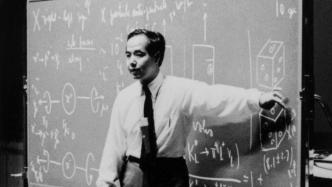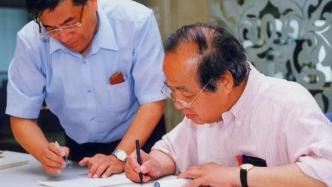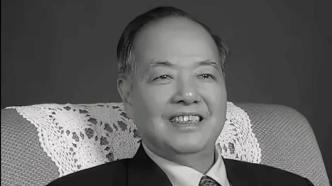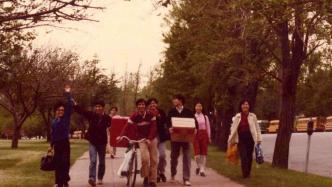
In the early morning of August 4th local time, Nobel Prize winner in Physics Tsung-Dao Lee passed away at his home in San Francisco, USA, at the age of 98.
As the president of the CUSPEA Scholars Association, Tang Chao, an academician of the Chinese Academy of Sciences and director of the Interdisciplinary Science Department of the National Natural Science Foundation of China, wrote an article to mourn Tsung-Dao Lee. In the article, Tang Chao said that the CUSPEA project initiated by Mr. Tsung-Dao Lee was an "ice-breaking move" that changed the fate of their group of students.
The full name of the CUSPEA program is the abbreviation of China-US Physics Examination and Application (China-US Joint Training Program for Physics Graduates), which was initiated by Mr. Tsung-Dao Lee. In the era without TOEFL and GRE, the CUSPEA program built the first bridge for outstanding Chinese students to study in the United States after the reform and opening up.
On the evening of August 5, The Paper (www.thepaper.cn) interviewed CUSPEA student Dong Jielin. She was far away in the United States when she learned of the death of Tsung-Dao Lee in the early morning. She was in a difficult mood. In 1982, Dong Jielin graduated from the Department of Electronic Engineering of Sun Yat-sen University. She came to the United States through an interview for CUSPEA, a joint physics graduate program hosted by Tsung-Dao Lee, and received a doctorate in physics from Carnegie Mellon University.
After coming to the United States, Dong Jielin felt the atmosphere of academic freedom. Here, she also fully explored herself. When she was a child, Marie Curie was her idol. After embarking on the path of scientific research, she also knew that it was not easy to become Marie Curie. "How many people can become Marie Curie?" Even if the conditions for scientific research of their generation are better than Marie Curie, there are still too many factors that make people give up halfway.
After completing her studies in the United States, Dong Jielin worked in finance, marketing, and publishing. She was the chief financial officer of a company and also started a business in Silicon Valley. But she couldn't let go of science. Now she is focusing on the history of technological innovation and technology communication.
While recalling the memory of Tsung-Dao Lee, Dong Jie Lin also recalled the golden age of the past. Although the original intention of the CUSPEA project was to cultivate talents in the field of physics, the selected students have different personalities and the paths they finally choose are also different. Dong Jie Lin said that even though everyone chooses different paths, the basic personality of CUSPEA students is the same, and they are full of interest and love for science.
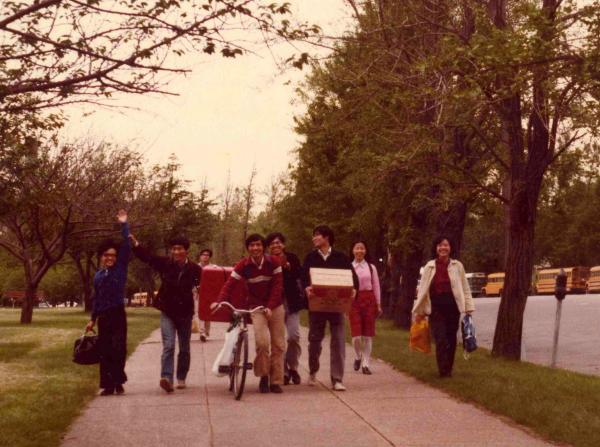
CUSPEA students in 1981. Dong Jielin is on the far right. Photo provided by the interviewee
At the 40th anniversary gathering of CUSPEA students, Tsung-Dao Lee wrote for them the inscription "Passing on the Torch". Dong Jie Lin is thinking that his future life is long enough, and whether he will have the opportunity to do something. For Dong Jie Lin, in the second half of his life, studying and telling the history of science and technology is also a continuation of the scientific spirit.
Here is her account:
He once mobilized students to sign a petition to invite Tsung-Dao Lee to the school
The news of Mr. Li's death came very suddenly. Around early morning, when our CUSPEA WeChat group of more than 400 students learned the news, everyone was shocked and very sad.
The Chinese name of the CUSPEA project is "China-US Joint Training Physics Graduate Examination Program". The project lasted for about 10 years, from 1979 to 1989, and trained more than 900 scholars, scientists and elite backbones in various fields.
At that time, this project was one of the things Mr. Li did for China. It mobilized more than 100 of the best schools in the United States to provide scholarships to outstanding students in Chinese universities to study physics in American universities. After China's reform and opening up, the channels for going abroad began to become more abundant. Although this project was terminated later, it was an ice-breaking and pioneering project with limited channels for studying abroad at that time, and it was also very important to us personally.
This project is also very important to China, because more than 900 students trained by it hold very important positions in the science and technology circles of China and the United States, and even in universities and technology companies around the world. In the end, about one-third of CUSPEA scholars returned to China and played their own roles in the Chinese Academy of Sciences or various universities and technology companies in China. The project also trained 15 scientists who became academicians around the world.
When I was studying in the Department of Electronics at Sun Yat-sen University, we students admired Mr. Li very much. I remember one time, we heard at school that Mr. Li and Mr. Yang Zhenning were coming to Guangzhou to attend a conference. At that time, we thought, since such great scientists have come to Guangzhou, why not invite them to our school? But at that time, students did not have any channels or such a big face, so we had to write an invitation letter and ask as many students as possible to sign it. In the end, we collected signatures from about hundreds of students on that invitation letter.
Later, they both came, and I received them as a student representative. At that time, Mr. Li was a young and energetic scientist, at the peak of his career, and he looked very energetic.
CUSPEA students have similar personalities and a strong interest in science
When I was a junior, I heard about the CUSPEA program. I was still very ignorant, and I only knew that if I passed the exam for this program, I could go to the United States to study. American universities not only subsidize tuition, but also provide living subsidies. I thought it was such a good thing, so I quickly prepared.
After passing the written test, I successfully passed the interview. In August 1982, I came to Carnegie Mellon University in the United States to study physics. I was in the third batch of students, and in the end, there were about 104 students who passed the assessment and came to the United States to study physics.
Even though I was studying physics, not every girl wanted to be Marie Curie. When I was a kid, Marie Curie was my idol, but how many people could become Marie Curie? After coming to the United States to study, although the academic atmosphere in the United States is free, it also means that no one will control you. Many times, you need to explore what you really want by yourself, and you have to be responsible for your own life.
I completed my master's degree in a year and a half, and then continued my postdoctoral studies. After graduation, I worked in finance, marketing, and publishing in the United States. I worked as a chief financial officer of a company and also started a business in Silicon Valley. But after all the twists and turns, science always made me want to let go. When I returned to China in 2011, I began to concentrate on the study of the history of scientific and technological innovation. I first taught innovation courses at Soochow University, and then worked as a part-time researcher at the Center for Science and Technology Policy Research at Tsinghua University.
Looking back on this experience, the CUSPEA program changed the trajectory of my life. My husband is also a CUSPEA scholar. He and I met at Carnegie Mellon University in the United States and later got married. CUSPEA scholars also have a lot in common. Although many people may not be scientists today, they still have a very high interest and curiosity in scientific issues.
For example, a classmate may work in the financial industry, but he will write scientific papers in his spare time, which is completely driven by his personal interests. I am not a scientist, but I still have a strong interest in science. So I am now doing a lot of research in the history of science, and in this way I am close to science and pay tribute to science.
Tsung-Dao Lee once gave us the inscription "Passing on the Torch"
In our WeChat group of more than 400 people, we discuss some issues from time to time, and the activity is very high. In addition, the CUSPEA Scholars Association regularly organizes activities to bring everyone together. For example, students in Shanghai regularly hold activities centered on the Tsung-Dao Lee Library of Shanghai Jiaotong University. Each exchange activity has a small theme, sometimes discussing new energy, sometimes exploring quantum technology. After the formal discussion, everyone can chat about life. These CUSPEA classmates have grown up together for more than 30 or 40 years. From childhood friends to old friends, they have experienced family, work and life in the meantime.
Now I feel a little calmer. I am very grateful to Mr. Tsung-Dao Lee. He gave me the opportunity to explore the many possibilities of life. There were many surprises and curious experiences along the way, and I finally lived the life I like.
I also have regrets for Mr. Li. The 20th anniversary of the CUSPEA Scholars Association held a seminar on the topic of Chinese physics in Beijing, and Mr. Li was there to share his experience. I was particularly impressed by the fact that Mr. Li said that he hoped that we, the CUSPEA scholars, could play an important role in the Chinese physics community in the 21st century.
I always feel guilty and ashamed because I did not engage in physics research in my later years, and I was not as determined as other students to go down the path of physics research. A few years ago, when we CUSPEA students gathered in Xi'an for the 40th anniversary, Mr. Li gave the theme of the gathering as "Passing on the Torch".
So next, I want to do something more.
